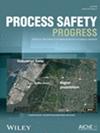Inhibition behavior and heat transfer of flame spread over liquid fuel with the influence of a step obstacle in the gas phase
IF 1
4区 工程技术
Q4 ENGINEERING, CHEMICAL
引用次数: 0
Abstract
The transportation of oil is an important aspect of chemical process safety. In the accidental leakage of oil and related products, the flame spread occurs occasionally when the liquid fuel is activated by a pilot flame. In the potential application of fire prevention, a step obstacle placed above the oil ditch may effectively hinder the flame spread. The effectiveness of the usage of a step obstacle depends on the size of the obstacle and the heat exchange mechanism. Therefore, the investigation of inhibition behavior and heat transfer of liquid flame spread with gas step obstacle is performed. The hot fluids flow inside the channel to carry out the convection heat to the initial cold oils on the opposite of the gas step obstacle. The flame configuration is blocked behind the step obstacle. The flame spread behaviors including flame morphology, inhibition time, and air entrainment are characterized and analyzed. The heat flows of flame radiation and liquid‐phase convection are theoretically calculated, and the primary heat transfer mechanism is determined. This work is helpful for the development of fire safety technology and the establishment of standard specifications for oil transportation.受气相阶梯障碍物影响的液体燃料火焰传播的抑制行为和热传递
油品运输是化工工艺安全的一个重要方面。在油类及相关产品的意外泄漏中,液体燃料被引火激活时偶尔会发生火焰蔓延。在潜在的防火应用中,在油沟上方设置台阶式障碍物可有效阻止火焰蔓延。阶梯障碍物的使用效果取决于障碍物的大小和热交换机制。因此,本文研究了气体阶梯障碍物对液体火焰蔓延的抑制行为和热量传递。热流体在通道内流动,将对流热量传给气体阶梯障碍物对面的初始冷油。火焰配置被阻挡在阶梯障碍物后面。对火焰形态、抑制时间和空气夹带等火焰传播行为进行了表征和分析。对火焰辐射和液相对流的热流进行了理论计算,并确定了主要的传热机制。这项工作有助于消防安全技术的发展和石油运输标准规范的制定。
本文章由计算机程序翻译,如有差异,请以英文原文为准。
求助全文
约1分钟内获得全文
求助全文
来源期刊

Process Safety Progress
工程技术-工程:化工
CiteScore
2.20
自引率
10.00%
发文量
99
审稿时长
6-12 weeks
期刊介绍:
Process Safety Progress covers process safety for engineering professionals. It addresses such topics as incident investigations/case histories, hazardous chemicals management, hazardous leaks prevention, risk assessment, process hazards evaluation, industrial hygiene, fire and explosion analysis, preventive maintenance, vapor cloud dispersion, and regulatory compliance, training, education, and other areas in process safety and loss prevention, including emerging concerns like plant and/or process security. Papers from the annual Loss Prevention Symposium and other AIChE safety conferences are automatically considered for publication, but unsolicited papers, particularly those addressing process safety issues in emerging technologies and industries are encouraged and evaluated equally.
 求助内容:
求助内容: 应助结果提醒方式:
应助结果提醒方式:


